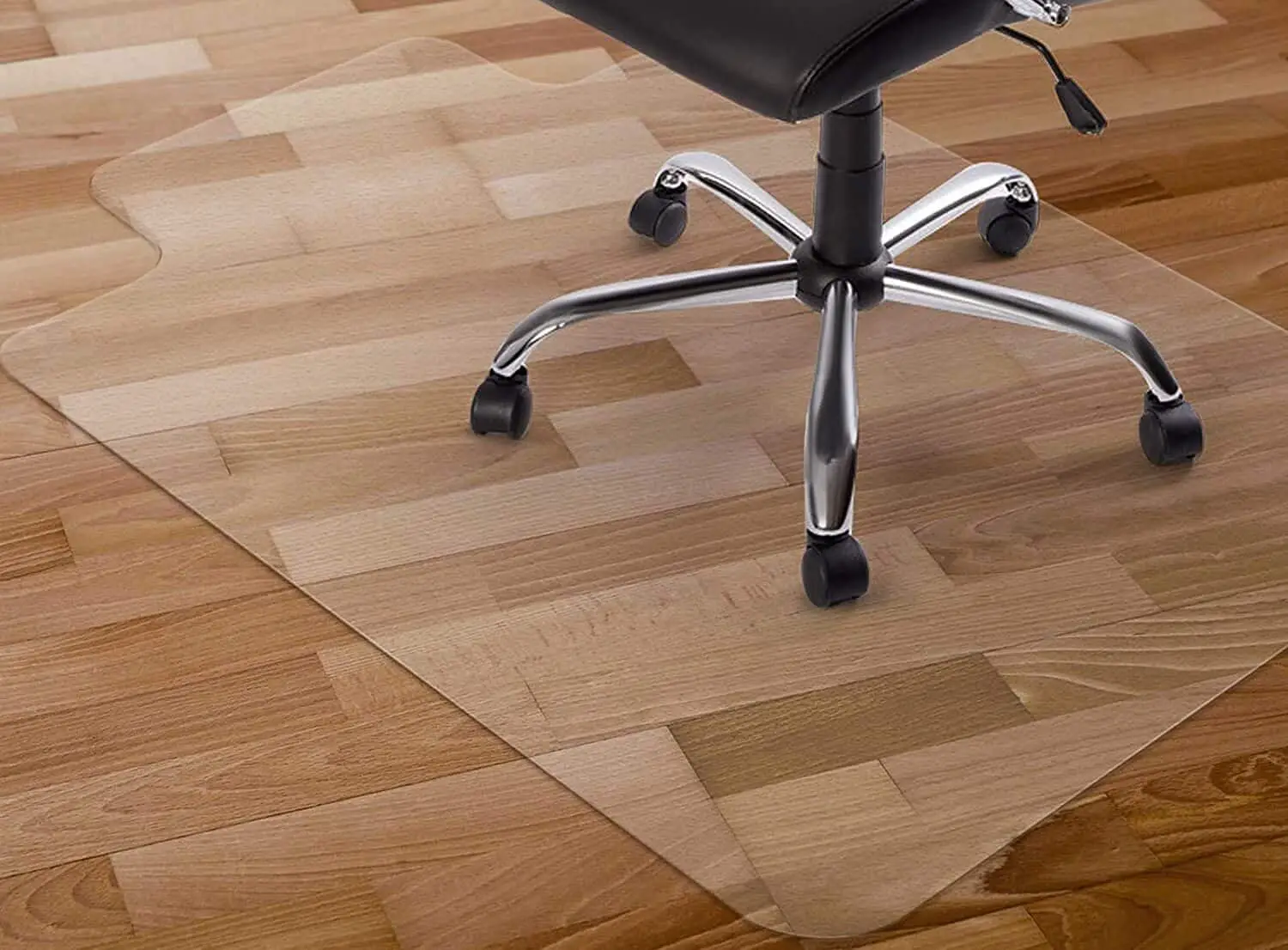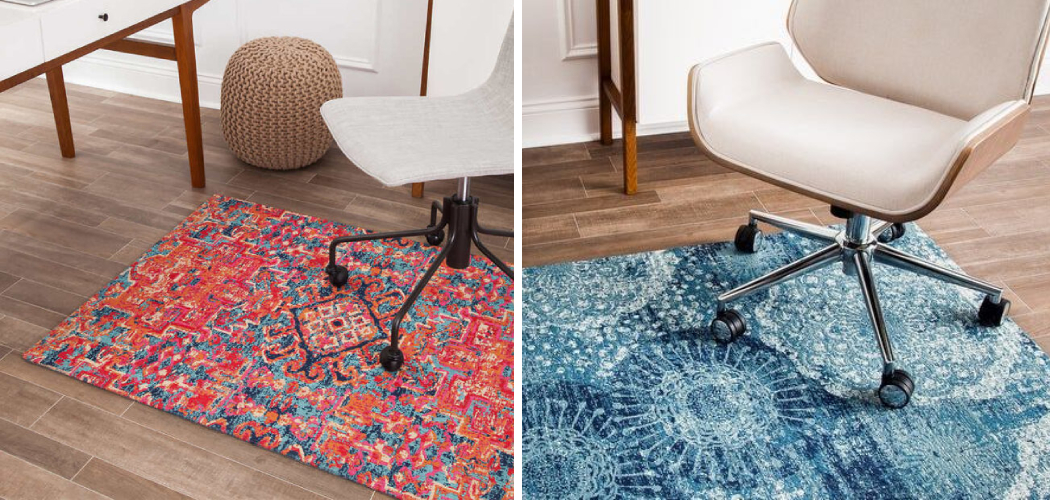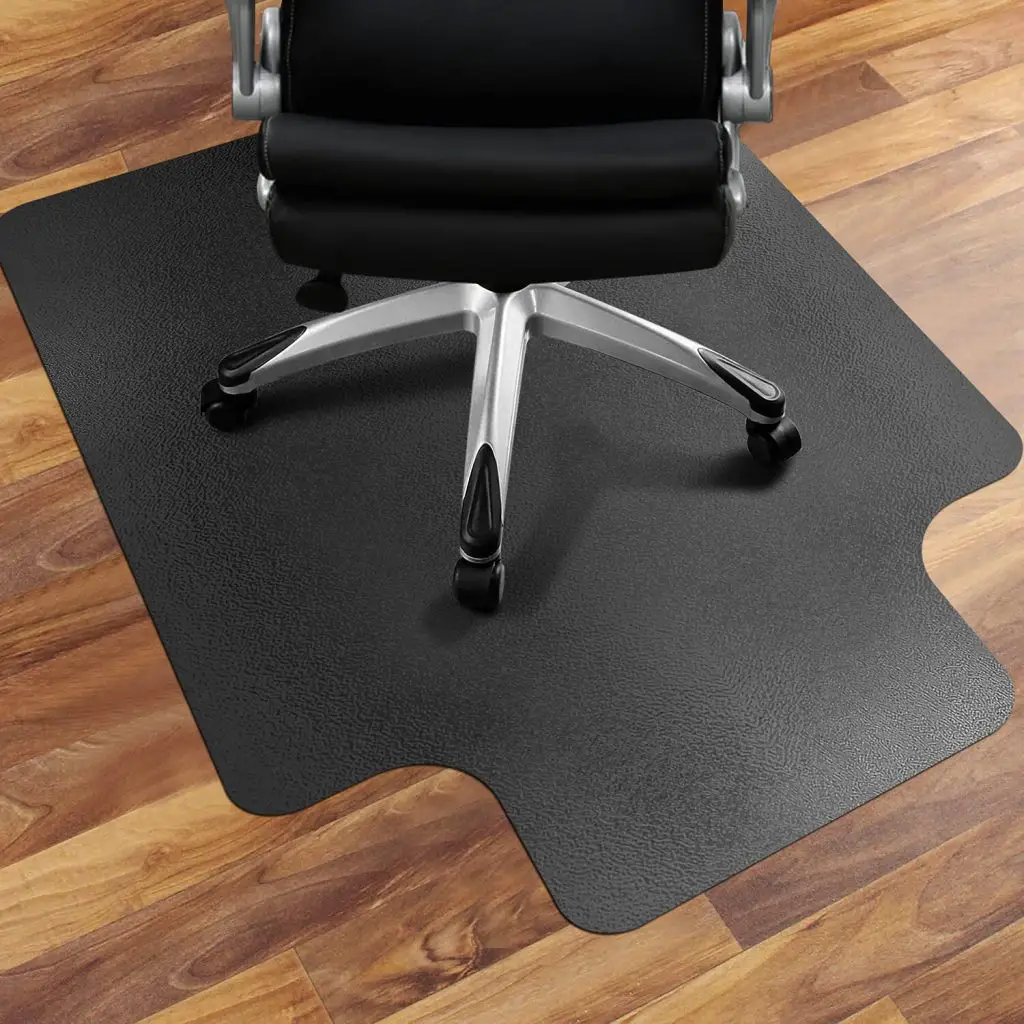The Need for Desk Chair Floor Protection: Desk Chair Floor Protector Hardwood

Hardwood floors, with their timeless beauty and natural warmth, are a cherished addition to many homes. However, the constant movement of desk chairs can pose a significant threat to the integrity of these floors. Over time, the rolling wheels of chairs can leave behind unsightly scratches, dents, and even permanent damage, diminishing the value and aesthetics of your hardwood investment.
Signs of Desk Chair Damage, Desk chair floor protector hardwood
It is crucial to be vigilant about the potential damage that desk chairs can inflict on hardwood floors. Early detection and preventative measures can help minimize the impact and preserve the beauty of your floors. Here are some common signs of damage caused by desk chairs:
- Scratches: The most prevalent sign of chair damage is the appearance of scratches on the surface of the hardwood. These scratches can be subtle or deep, depending on the type of chair wheels and the hardness of the wood.
- Dents: When the chair wheels exert excessive pressure on the floor, they can create dents, especially if the wood is soft or the wheels are heavy. These dents can be shallow or deep, depending on the force applied.
- Gouges: In extreme cases, the chair wheels can gouge the hardwood floor, leaving behind deep, unsightly marks that are difficult to repair.
- Discoloration: The constant friction between the chair wheels and the floor can lead to discoloration, especially on lighter-colored woods. This discoloration is often caused by the transfer of dirt and debris from the wheels onto the floor.
Types of Desk Chair Floor Protectors

Just as a sturdy foundation supports a magnificent building, a well-chosen desk chair floor protector provides stability and safeguards your precious hardwood floors from the wear and tear of daily use. Let’s explore the diverse world of these protectors, understanding their unique strengths and weaknesses to guide you in choosing the ideal companion for your chair.
Floor Mats
Floor mats are like protective shields, covering a larger area to protect your floors from the impact of chair movement and potential spills. They come in various materials, each with its own set of advantages and disadvantages.
- Vinyl Mats: Vinyl mats are durable and water-resistant, making them excellent for high-traffic areas. They are typically affordable and easy to clean, often featuring a textured surface for added grip. However, they can be less aesthetically pleasing than other options and might not provide the same level of cushioning.
- Rubber Mats: Rubber mats offer superior cushioning and sound absorption, reducing noise from chair movement. They are also durable and slip-resistant, ideal for hard floors. However, they can be more expensive than vinyl mats and might be prone to staining.
- Carpet Mats: Carpet mats provide a soft and comfortable surface for your chair, offering excellent cushioning and noise reduction. They are available in various colors and patterns, allowing you to match your decor. However, they can be more susceptible to stains and require regular cleaning.
Chair Pads
Chair pads are like small, focused protectors, specifically designed to prevent damage to your floors from the chair’s base. They are often attached to the chair’s legs or wheels, offering a targeted solution for localized protection.
- Felt Pads: Felt pads are inexpensive and readily available, offering a soft and quiet surface for your chair to glide across your floors. They are ideal for light-duty use and are particularly effective on softer wood floors. However, they are prone to wear and tear and may not provide sufficient protection on hard floors.
- Plastic Pads: Plastic pads are durable and resistant to wear and tear, offering a more robust solution than felt pads. They are often available in various sizes and shapes, providing a good fit for most chair legs. However, they can be noisy when moving on hard floors and might not provide the same level of cushioning.
- Rubber Pads: Rubber pads offer a balance of cushioning and durability, providing a quiet and smooth glide on your floors. They are often designed with a textured surface for added grip, preventing your chair from sliding or slipping. However, they can be more expensive than other options and might not be as readily available.
Chair Wheels
Chair wheels are the foundation of smooth movement, but they can also be a source of damage to your floors. Fortunately, there are specialized wheels designed to minimize the impact and protect your floor surfaces.
- Hard Casters: Hard casters are typically made of plastic or metal and offer a smooth, effortless glide on hard floors. However, they can be noisy and prone to scratching, especially on softer wood floors. They are not recommended for delicate floors.
- Soft Casters: Soft casters are designed with a rubber or polyurethane coating, providing a quiet and cushioned ride on your floors. They are ideal for protecting delicate floors and minimizing noise. However, they can be more expensive than hard casters and might not be as durable.
- Floor Protectors for Casters: These are specialized covers that can be attached to existing casters, providing a layer of protection for your floors. They are available in various materials, including felt, rubber, and plastic, and can be customized to fit different caster sizes.
Choosing the Right Floor Protector

Choosing the right desk chair floor protector is an important step in protecting your floors and ensuring a smooth, comfortable rolling experience. Just like choosing the right shoes for a specific activity, selecting the right floor protector depends on various factors.
Factors to Consider When Choosing a Floor Protector
Understanding your needs and preferences is crucial in selecting the most suitable floor protector. Consider these factors:
- Chair Type: Different chairs have different weight capacities and rolling mechanisms. Heavy chairs with wheels that rotate freely might require more robust floor protection than lighter chairs with limited mobility. For instance, a heavy office chair with swivel wheels might necessitate a thicker, more durable protector than a lightweight gaming chair with fixed wheels.
- Floor Type: The type of flooring you have plays a significant role in choosing the appropriate floor protector. Hardwoods, laminates, and tiles require different protection compared to carpets. For example, a hard plastic protector might be suitable for hardwood floors, while a soft felt protector might be better for carpets.
- Budget: Floor protectors come in various price ranges. Consider your budget and choose a protector that offers the right level of protection without breaking the bank. For instance, a simple felt pad might be cost-effective for light-duty use, while a high-quality, multi-layered protector might be more expensive but offer greater durability and protection for heavy chairs.
- Aesthetic Preferences: You can choose a floor protector that complements your decor and blends seamlessly with your flooring. For example, a clear protector might be suitable for minimalist aesthetics, while a patterned protector might add a touch of personality to your workspace.
Types of Floor Protectors
There are various types of floor protectors available, each with its own advantages and disadvantages.
| Type | Features | Considerations |
|---|---|---|
| Hard Plastic | Durable, affordable, easy to clean | Can be noisy, may scratch delicate floors |
| Felt | Soft, quiet, protects delicate floors | May wear out quickly, not suitable for heavy chairs |
| Rubber | Durable, grippy, protects floors from scratches | Can be expensive, may leave marks on some floors |
| Multi-Layered | Combines different materials for maximum protection and durability | Can be expensive, may be bulky |
Comparing Floor Protector Options
It’s essential to understand the pros and cons of different floor protector options to make an informed decision. Consider the following:
- Hard Plastic: These protectors are affordable, durable, and easy to clean. However, they can be noisy and may scratch delicate floors. They are suitable for light to medium-duty use on hard floors.
- Felt: Felt protectors are soft, quiet, and protect delicate floors from scratches. However, they may wear out quickly and are not suitable for heavy chairs. They are ideal for light-duty use on carpets or delicate floors.
- Rubber: Rubber protectors are durable, grippy, and protect floors from scratches. However, they can be expensive and may leave marks on some floors. They are suitable for heavy-duty use on hard floors.
- Multi-Layered: These protectors combine different materials for maximum protection and durability. They are suitable for heavy-duty use on all floor types but can be expensive and bulky.
“The best floor protector is the one that meets your specific needs and preferences.”
Desk chair floor protector hardwood – Protecting your hardwood floors from the wear and tear of a desk chair is essential, especially when you have a lively young one at home. An orange kids desk chair, like the ones featured in this article , can add a vibrant touch to their workspace.
However, it’s important to remember that a good floor protector can help keep your floors looking their best, ensuring a safe and stylish environment for your child’s creative endeavors.
Protecting your hardwood floors from the wear and tear of your desk chair is essential, especially if you’re looking to maintain that pristine look. A modern blue desk chair, like the ones found here , can be a stylish addition to any office space.
However, it’s important to remember that even the most stylish chair can leave marks on your floors without proper protection. A desk chair floor protector will ensure your floors stay beautiful and your chair glides smoothly.